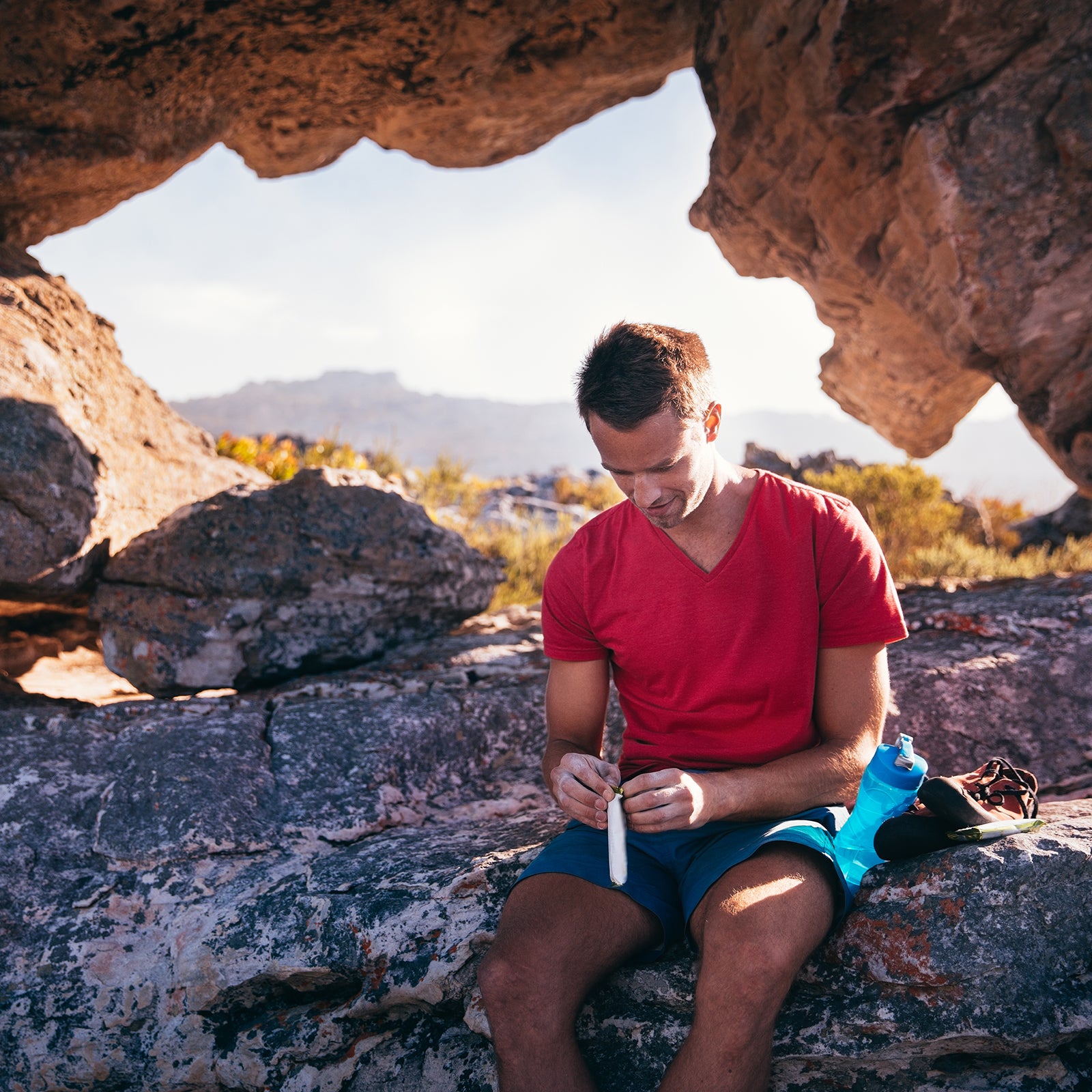Setting out for a backpacking trip��and then stuffing your bag with energy bars and freeze-dried meals wrapped in plastic is one of the best examples of cognitive dissonance in outdoor recreation. Leave No Trace has preached “pack it out,” but then what? It comes out of the backcountry only to get tossed in with the��billions of tons of plastic waste��sitting in landfills or getting swept into oceans.��
We are trashing our planet, and nature lovers are part of the problem. So��where are all the green companies doing compostable packaging for backpacking food?
It turns out that revamping packaging systems is more complicated than people in the��food industry realized��when they first set out to tackle the issue. Even Patagonia Provisions—one of the outdoor industry’s leaders in sustainability efforts—is struggling. “You have to consider the producer of the product, the machinery they have, the waste-management end of it, and, in the case of food, the barriers the packages��provide to keep the food safe,” says Birgit Cameron, ��managing director.��
Ever since Patagonia Provisions��launched its fruit bars in 2015, it’s been working toward��a compostable wrapper. The company is currently��on the��fourth iteration, and there are still problems. One issue is that the compostable film is just different enough from traditional wrappers that it slows down the manufacturer’s packaging equipment. “The texture and thickness work��differently��on the machines,” says Cameron. It doesn’t slip as seamlessly through the production line, and that means it takes longer to package��the bars, which means the manufacturer has to charge more—since the process is��holding up that��production line. And price is important: sustainable food should not just be for the rich.
Then there are the other problems. When Kate Flynn left corporate America in 2017 to start , a snack-food company based in Santa Barbara, California, a big part of her goal was to��run��a responsible business. She formed Sun and��Swell as a B Corp and signed on with��, an organization of companies that have pledged to donate at least 1��percent of annual sales to environmental nonprofits. “But we were still contributing to the problem of single-use plastics,” she says. “About once a month, I’d ��do these really aggressive Google searches, trying to find a solution.” Finally,��, a company based in Israel specializing in compostable packaging, popped up in her search results.
In March of 2019, Flynn committed to all-compostable packaging, intending to have her entire line wrapped in the material by the end of the year. That hasn’t happened. “What we learned is that there are so many more complexities than we ever knew. People think it just costs more, but really that’s the least of the concerns,” she says.��
Sun and��Swell’s biggest issue has been the life span of the wrappers. TIPA guarantees them for nine months. “But that’s [from] when it comes off the line at the printer. Our experience is that it has been a little less than nine months,” Flynn says. The��packages have a little transparent window on them, and��as the packages age, the window starts to get milky and look funky. Then, of course, customers are hesitant to buy them. “It turns into a food-waste issue,” she says.��
We are trashing our planet, and nature lovers are part of the problem.
And this is the thing about plastic that��makes the��whole debate so complicated: it’s been hugely helpful in reducing our global food waste—another massive driver of global emissions. Take, for example, grapes. When they’re packaged in plastic bags, their . Left loose, their shelf life would be ten��days. Until we can change our��system so we’re more reliant on local food,��plastic will be��a necessary evil.����
There’s also the fact that sealing up food is one great way to ensure that it is safe. When Ashley Lance started her vegan, eco-conscious backpacking meal business����last year, she really wanted it to be��zero-waste. But Lance’s��local USDA officer, who��helped��her get her products certified as safe to sell, wasn’t convinced that zero-waste sales could ever get the regulatory thumbs-up. “For the USDA to sign off on it, it has to be in an airtight, waterproof container,” she says. For local orders, she stores her company’s food in jars. But because jars are heavy and breakable, shipping them doesn’t make much sense for smaller companies like Lance’s.����
Her work-around is shipping each item in reusable muslin bags. Those bags are then sealed into a compostable outer package, which satisfied the USDA. It’s not quite zero waste, but it’s as close as Lance��feels she’s going to get with the current regulations. Of course, users can’t make their meals directly in the bags—they’ll need a pot. But Lance says most of��her customers see that as a feature, not a bug. On the trail, she dumps her dinner into a reusable silicone bag and adds hot water. She keeps one for sweet things and one for savory in her pack. At the end of her trips, she has almost no plastic garbage to unload.����
The fact that small companies like Fernweh and Sun and��Swell are devoting themselves to this mission is��great, but we really need systematic change. One current problem with compostable packaging is that “compostable” is a nebulous term. Things that compost quickly in an industrial system may take months in your backyard compost pile. And a lot of cities don’t offer compost pickup at all, so these wrappers just sit in landfills. “We have a waste system set up. The problem is that it isn’t quite working,” says Cameron.
Patagonia Provisions is actively looking at whether it can use its Tin Shed Ventures—the company’s venture-capital fund—to kick-start a system purpose-built for compostable wrappers. This might include building industrial composting facilities and encouraging manufacturers to invest in machines that seal��compostable packages just as fast as plastic ones. “Like anything we do, being in a system fully so we can work on it��to figure out how to change it is sort of what we’re up to,” says Cameron. And because Patagonia Provisions is large, it may be able to create a lucrative market for entrepreneurs making more eco-friendly packaging. “What often happens is that people start to adopt what we find,” she says.��
In the meantime, a handful of outdoor brands are engaging with a recycling company called��. Brands pay TerraCycle to collect and recycle wrappers and other hard-to-recycle stuff. Right now, Backpacker’s Pantry, Clif Bar, Gu, and Mountain House��all participate. TerraCycle will send individual consumers an envelope that they can use to return their wrappers.��Those become recycled plastic pellets, which can be melted down and reused. While this is definitely better than packaging��going to a��landfill, it’s not a perfect system, since it takes energy to melt and ship them. Still, it’s a good step for companies who want to move toward��zero waste but are hesitant—or unable—to jump completely in. ��
But let’s hope that more companies adapt and move toward��zero-waste practices sooner rather than later, so we can start enjoying our meals in the mountains without a side of guilt.��������


